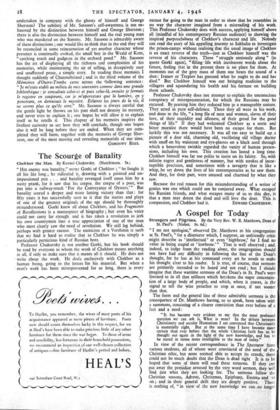The Scourge of Banality
Chekhov the Man. By Kornei Chukovsky. (Hutchinson. 5s.)
" His enemy was banality," wrote Gorki of Chekhov ; " he fought it all his life long ; he ridiculed it, drawing with a pointed and un- impassioned pen . . . and banality revenged itself upon him by a nasty prank, for it saw that his corpse, the corpse of a poet, was put into a railway-truck For the Conveyance of Oysters.'" But banality scored a deeper and more lasting victory than that: for fifty years it has successfully seen to it that the stories and plays of one of the greatest originals of the age should be thoroughly misunderstood. Gorki knew all about Chekhov, and his Fragments of Recollections is a masterpiece of biography ; but even his voice could not carry far enough, and it has taken a revolution to jerk his own countrymen into a true appreciation of one of the men who most clearly saw the need of revolution. We still lag behind, perhaps with greater excuse. The exoticism of a Vershinin is such that we find it hard to realise that to Chekhov he was simply a particularly pernicious kind of Russian bore.
Professor Chukovsky is not another Gorki, but his book should be read by everyone to whom the work of Chekhov means anything at all, if only to make sure that it means all it should. He does not write about the work. He deals exclusively with Chekhov as a human being, going to the letters for his material. But when a man's work has been misrepresented for so long, there is every excuse for going to the man in order to show that he resembles in no way the character imagined from a misreading of his work.
This Professor Chukovsky does with success, applying himself above
all (mindful of his contemporary Russian audience) to showing the inspired purposefulness of Chekhov's character and life. Nobody
can read the story of his appalling journey to Sakhalin to investigate the prison-camps without realising that the usual image of Chekhov is an exact reverse of the truth—just as Chekhov himself was the reverse of his characters. These "struggle anxiously along " (to quote Gorki again), "filling .life with incoherent words about the future, feeling that in the present there is no place for them. At moments out of the grey mass of them one hears the sound of a shot: Ivanov or Treplov has guessed what he ought to do and has died." But Chekhov himself was out bringing medicine to the villagers and squandering his health and his fortune on building them schools.
Professor Chukovsky does not attempt to explain the unconscious conspiracy of misrepresentation, for which the Russians may be excused. By praising him they reduced him to a manageable stature. They acted in pure self-defence. There they all were in his work, and done to the life, "a long file of men and women, slaves of their love, of their stupidity and idleness, of their greed for the good things of life." If they had welcomed Chekhov as a stern and bitter moralist there would have been no escape for them. But luckily this was not necessary. It was all too easy to build up a picture of a dear old, charming old, vacillating old village doctor with snuff on his waistcoat and eye-glasses on a black cord through which a benevolent twinkle regarded the vanity of human preten- sions, including his own. This creation has lasted a long time. Chekhov himself was far too polite to insist on its falsity. So, with infinite regret and gentleness of manner, but with strokes of incor- ruptible precision, and sometimes with a savagery that is like a whip, he set down the lives of his contemporaries as he saw them. And they, for their part, were amused and charmed by what they saw.
Because the real reason for this misunderstanding of a writer of genius was one which could not be conjured away. What escaped his Russian friends, and what escapes many of us to this day, is that a man may detest the deed and still love the doer. This is































 Previous page
Previous page